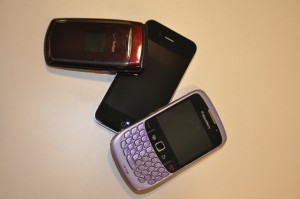
WASHINGTON – Planes are one of the few places, it seems, where talking on a mobile phone is banned. While experts say the original reason for the ban – a worry that cellular signals could pose a threat to an aircraft’s safety systems – has largely been solved, federal regulations still require you to turn off your cell phone while flying.
But legislation making its way through Congress could change that. As part of the reauthorization bill for the Federal Aviation Administration, a key House committee would require an impact study on the use of vocal communications during flight.
“Other countries have been allowing cell phone use, so it seems a good opportunity to assess how well that is working,” said Justin Harclerode, spokesman for the House Committee on Transportation and Infrastructure.
Currently, both the FAA and the Federal Communications Commission prohibit the use of cell phones on any airborne aircraft.
Guidelines ask that passengers turn off any electrical devices during takeoff and landing, which FAA Public Affairs Officer Les Dorr called the “critical phases of flight.”
As any frequent flier knows, passengers are permitted to turn on any device that does not transmit a radio signal after the plane has reached 10,000 feet.
Radio transmissions from electronic devices had been questioned because officials believed they might interfere with the plane’s navigation or communications equipment. But the Radio Technical Commission for Aeronautics, a federal advisory group, conducted a five-year study that found there was no conclusive data to show that portable electronic devices interfere with plane systems in any way.
The co-chair of the committee, David Carson of Boeing, said the study recommended new airplane designs that would tolerate portable electronic device use and offered suggestions for airplane operators to allow those devices to be used during flight.
While the FAA cell phone ban addressed flight safety, the FCC’s ban was aimed at another problem: whether in-flight use of wireless devices on aircraft could cause harmful interference to wireless networks on the ground. Because the commission study did not have enough technical information to address that concern, the FCC decided to continue its prohibition on in-flight use of cell phones.
In addition, when the FCC announced it was considering lifting the ban, “the thousands of comments the FCC received … were from consumers who didn’t want to be annoyed by people sitting next to them on the plane, talking on their phones,” Carson said.
Adding a phone service capability to commercial flights also has the potential to jam up cell networks, and cause billing and roaming issues for consumers and carriers, he said.
Southwest Airlines spokeswoman Katie McDonald said her airline would want to do a lot of research with customers before that kind of decision is reached.
“Our primary concern is always the safety of our employees and our passengers,” McDonald said. “We’d have to work with the FAA and other agencies to put rules in place about cell phone use should the policy ever be lifted. It’s all speculation at this point.”
The FAA’s Dorr said that because the FCC ban still stands, there has been no other action taken to see if radio signals actually do interfere with an aircraft’s equipment.
“Right now, the outlook for using your cell phone on any kind of aircraft in the U.S. looks bleak,” he said.
